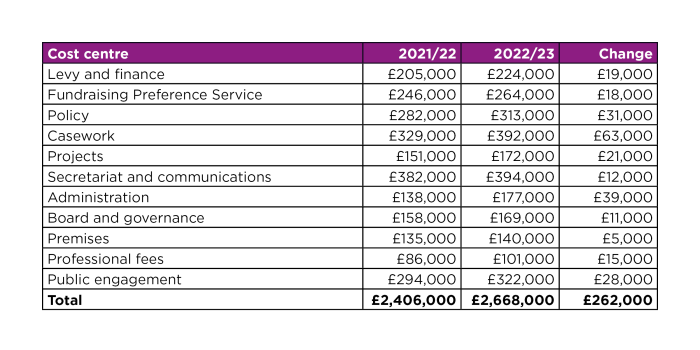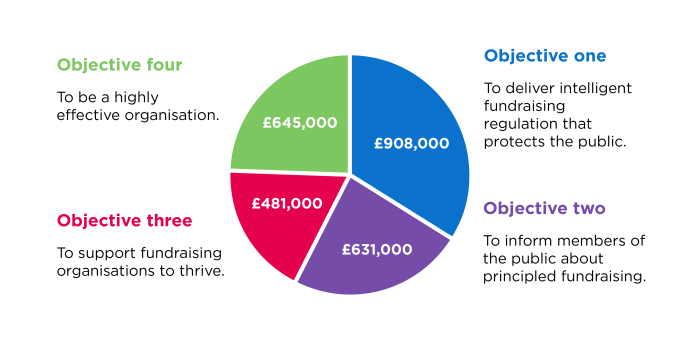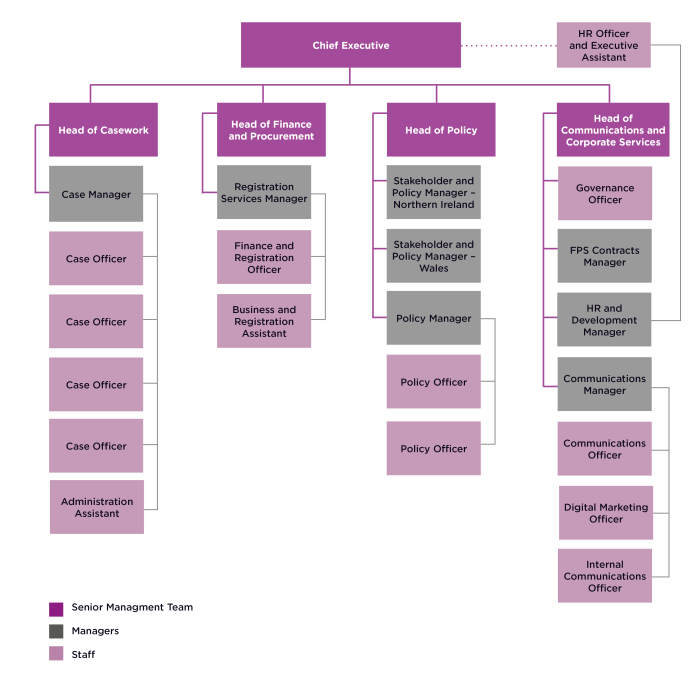Contents
Introduction
This is the first business plan that falls within the scope of our new Strategic Plan 2022-2027. The strategy sets out our view of how we will deliver the effective regulation of charitable fundraising over the next five years.
Themes
Our regulation is risk, evidence and outcomes based. There are cross-cutting themes running through our objectives, which together will guide us to regulate charitable fundraising effectively. These are:
- Innovative: We will keep abreast of digital and wider social developments and how these may shape fundraising into the future. Our regulation will evolve accordingly.
- Proactive: We will continue to develop our proactive approach, strengthening the work we do to ensure compliance with the code, in addition to complaints handling. We will prioritise proactive regulation where we identify issues that may cause harm to the public or damage to the reputation of charitable fundraising even if those issues have not attracted complaints.
- Intelligent: We will use our data more intelligently to support the development of the code and our compliance work. We will collect and share fundraising data from others to inform our regulatory priorities and to share knowledge and learning.
- Collaborative: We will bring in views from across the fundraising sector and the wider public so that we remain a thought leader in fundraising. We will create new information sharing opportunities to ensure that fundraisers and the public have a greater voice in developing our policies. As part of this, we will strengthen relationships with other regulators and government.
Strategic objectives
All our work is delivered in line with the following strategic objectives:
- To deliver intelligent fundraising regulation that protects the public.
- To inform members of the public about principled fundraising.
- To support fundraising organisations to thrive.
- To be a highly effective organisation.
This year’s budget allows us to deliver our core business as usual activity, alongside key 2022/23 projects. This effectively means:
- Operating the Fundraising Preference Service (FPS) at present or at increased levels of activity.
- Continuing to offer advice on high standards of fundraising through our code advice service, available either online or over the phone.
- Managing complaints casework at up to 100 complaints per month (1,200 per year).
- Maintaining Fundraising Levy and registration activity at present levels, with the additional capacity to process up to 70 new applications per month for registration and increasing numbers of annual renewals.
Priorities for this year
The priorities for this year are as follows:
To deliver intelligent fundraising regulation that protects the public
We want to increase our knowledge and understanding of how the fundraising sector is changing so that we can target our regulation in the most effective ways.
To do this, we need to further develop our use of data, from our own sources, the sector and from wider stakeholders. We also want to ensure that we fully understand developments in digital fundraising, the use of new technologies, and how fundraising is changing more broadly.
Key deliverables
- Launch a review of the Code of Fundraising Practice (the code) to ensure that it remains up to date, accessible, and reflects best practice in fundraising. As part of that review, we will engage with the sector on changes in fundraising, including the increasing use of digital and the changing role of fundraisers.
- Complete our compliance work with fundraising platforms to ensure that they are compliant with the code and with our Terms and Conditions.
- Increase internal capacity to support a proactive regulatory approach by scoping out any additional resourcing required and recruiting into those post(s).
- If staff resources permit, begin to investigate what data is held by other relevant sources, with a view for this to continue throughout 2023/24.
- Investigate how artificial intelligence can support intelligent regulation by providing insights from data sources held internally and externally.
To inform members of the public about principled fundraising
The last few years have shown us that people continue to give generously, despite the financial pressures that many of them will have been under. This generosity exists in support of high-profile fundraising ventures, as well as support for more local causes.
It is our role to make sure that whatever fundraising is taking place, standards remain high, and the public continues to be protected.
We will continue to operate an open and accessible complaints service that offers the public independent investigation of their complaints and assistance in getting them resolved. We will also continue to provide a way for the public to manage their communications with charities through the FPS.
Key deliverables
- Review the effectiveness of our public marketing activity, in particular the marketing of the Fundraising Badge.
- Develop a new communications strategy to engage and protect the public.
- Develop additional public facing materials to help them understand fundraising and to make decisions about whether to support personal cause fundraising.
- Update our public Fundraising Directory following user feedback.
To support fundraising organisations to thrive
To ensure that organisations involved in charitable fundraising are able to do so in a way that is legal, open, honest, and respectful we will continue to maintain and develop the code.
We know that the code remains a vital tool for all fundraisers, so we will ensure that as we develop it, we do so by listening to views not only from the fundraising sector but also from the public.
The code alone is not enough to ensure fundraising excellence, so we will continue to share learning through our Annual Complaints Report and the summaries of our casework.
In addition, we will carry out targeted policy interventions looking at two key areas of fundraising practice where we see lots of enquiries from the public and fundraisers. These are volunteer fundraising and commercial participation.
Key deliverables
- Create a panel of fundraisers and/or fundraising compliance staff to share insights on fundraising practice.
- Deliver targeted policy interventions in relation to two key areas of fundraising practice: volunteer fundraising and commercial participation.
- Begin a review of the Annual Complaints Report, focusing on part two (complaints reported by a sample of large charities), and engaging with the sector on proposals to make improvements to that part of the report.
- Publish the Annual Complaints Report.
- Review the self-reporting pathway and produce additional guidance on reporting thresholds.
To be a highly effective organisation
We will continue to carefully monitor our expenditure to ensure we are offering value for money and make efficiencies where possible. We are keenly aware of how we are funded and take our budgeting responsibilities seriously.
The levy and registration levels that are currently in operation have been in place since our launch. In this strategic plan period (2022-27) we anticipate reviewing the current levels to ascertain whether they remain appropriate. Any changes will depend on a range of factors such as whether the number of charities within the levy and registration scheme increases and the rate of general inflation.
We are aware of the wider societal and political contexts in which we operate and our position as a regulator. This position means that we take matters such as sustainability, and equality, diversity, and inclusion, seriously and work to make continuous improvements.
Key deliverables
- Agree a framework through which to review the levy.
- Further develop our Equality, Diversity and Inclusion (EDI) Strategy to look at the impact we can make through our regulation, as well as internally with our own staff and suppliers.
- Review what similar organisations are doing to develop sustainability goals.
Resources
Charity and non-charity registration scheme
The Fundraising Regulator’s scheme of voluntary fundraising regulation in England, Wales and Northern Ireland is mainly funded by the Fundraising Levy. The levy is paid by the charitable organisations that conduct the most fundraising activity. Around 2,000 charities are currently within the scope of the levy, which is based on a sliding scale of payments for all charities spending £100,000 or more on fundraising per year.
The rest of our income comes primarily from a registration scheme for smaller fundraising charities and non-charities (such as commercial businesses, Community Interest Companies and public interest bodies) that engage in charitable fundraising. Smaller charities spending less than £100,000 a year on fundraising pay £50 a year to register with us. Non-charities pay registration fees on a sliding scale according to their fundraising turnover.
All organisations that commit publicly to meeting the Code of Fundraising Practice, and pay the relevant registration fee (currently around 5,500 bodies), can display the Fundraising Badge on their fundraising materials, and are encouraged to do so.
Budget for 2022/23
Our budget for 2022/23 is £2.668 million, which represents an increase to our planned expenditure in previous years. This will enable us to carry out more regulatory activities as we come out of the coronavirus (COVID-19) pandemic period.
In terms of income, we expect to raise £2.4 million in 2022/23. Around 92%, or £2.2 million, is forecast from the levy, while an additional £100,000 will come from smaller charity registrations and another £100,000 from non-charity registrations.
This year we are operating a deficit budget. Our levy income is forecast to drop by c. £200,000 as levy demands are based on accounts for 2020. These reflect the impact of the pandemic when many fundraising charities suspended normal fundraising activity and many staff were furloughed. In addition, we have suffered greater than anticipated inflationary increases to most of our budget items.
Staffing
Our commitment to offering value for money means we look to regulate in a way that is as efficient and effective as possible. This includes making sure our workforce remains skilled and supported to do their work.
Our staffing costs constitute a substantial part of our expenditure in 2022/23 at about 60%. We have already taken on two extra staff in our casework team to help support proactive work and have budgeted for another post that would support more data analysis. This will result in 27 members of staff working in four teams – casework; communications and corporate services; finance and procurement; and policy.



